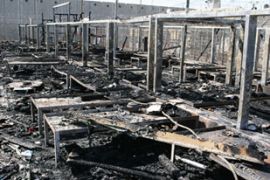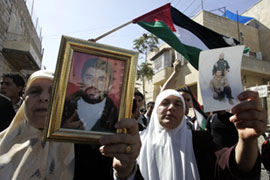Protests after Israel prison riot
Palestinians march and inmates launch hunger strike after one deadly clash.

The guards fought back with tear gas, rubber bullets and batons. At least 15 prisoners and 15 guards were injured in the violence.
‘Non-lethal weapon’
The Israeli prison service said that it was a “non-lethal weapon” that had injured the prisoner who later died in hospital.
It did not reveal his identity, but said he was 30-years-old and serving a two-year sentence.
 |
| About 10,000 Palestinians are being held in prisons in Israel [AFP] |
The relatively short sentence suggested his offence must have been minor, he said.
Al Jazeera’s Jacky Rowland in Ramallah said the violence at the Ketziot jail had provoked protests in the West Bank and Gaza Strip as almost every Palestinian family has a relative who is, or has been, a prisoner in Israel.
On Tuesday, about 200 people marched through Ramallah, chanting: “We want the prisoners, not negotiations.”
Rowland said the timing of the incident was important coming just weeks before peace talks between Israeli and Palestinian leaders in the United States.
“Many Palestinians are saying, look if this type of thing going on just weeks before the peace talks what does it say about the extent to which the Israelis are really dealing in goodwill,” she said.
‘Painful options’
The military wing of Hamas denied earlier reports that it had threatened to harm the captured Israeli soldier Gilad Shalit in retaliation for the prison death.
| “I think the unrest amongst the Hamas prisoners is [caused by the fact] that we don’t release Hamas prisoners” Ehud Olmert, Israeli prime minister |
Ehud Olmert, the Israeli prime minister, said the prisoners involved in the clashes were Hamas members.
“I think the unrest amongst the Hamas prisoners is [caused by the fact] that we don’t release Hamas prisoners. We release Fatah prisoners,” he said.
“We have released hundreds of Palestinian prisoners and we will consider a release of more, but none of them will be Hamas, because Hamas continues to be engaged in terrorist actions against Israel.”
The violence broke out after guards began searching prisoners’ bunks for contraband.
Ajrami said the security sweep violated an agreement between the prisons service and inmates barring night-time searches and appeared to be aimed at intimidating imprisoned Palestinian fighters.
About 2,000 Palestinians are held at Ketziot, 700 of them have never had charges brought against them. The jail is set up like a military camp, with prisoners quartered in tents rather than buildings.